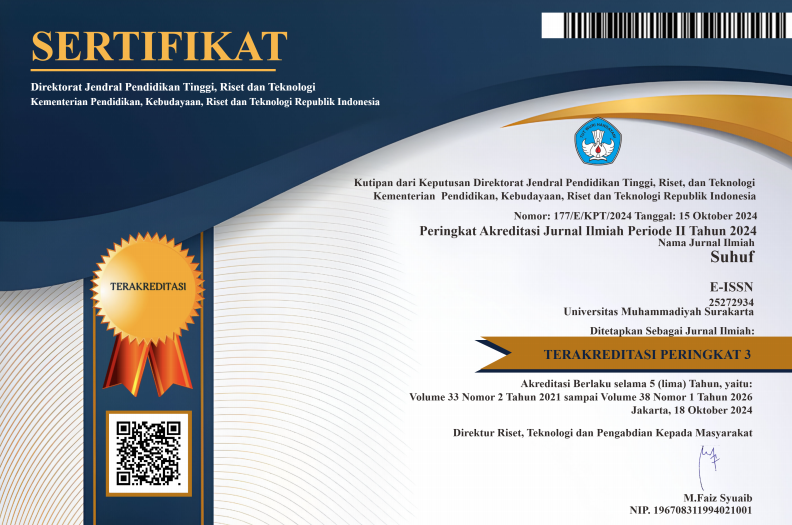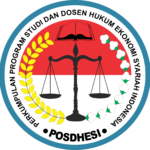Exploring the Relationship Between Shariah Education and National Identity in Nigeria’s Universities
DOI:
https://doi.org/10.23917/suhuf.v37i2.12437Keywords:
Cultural affirmation, National belonging, Educational policy, Ethnic and cultural diversity, Shariah educationAbstract
This study examines the intricate relationship between Shariah education and the formation of national identity within Nigerian universities. As a country marked by religious, ethnic, and cultural diversity, Nigeria faces ongoing challenges in forging a cohesive national identity. The inclusion of Shariah-related courses in university curricula, particularly in institutions located in the predominantly Muslim northern region, raises critical questions about the role of religious legal education in a secular and pluralistic state. Using a multidisciplinary methodology that combines legal analysis, educational policy review, and qualitative interviews with students and faculty, this research investigates how Shariah education influences perceptions of citizenship, national belonging, and social cohesion. Findings suggest that while Shariah instruction can serve as a means of cultural affirmation and moral guidance, it also has the potential to either bridge or deepen national divides depending on how it is framed and integrated within broader academic and civic discourses. The paper concludes with recommendations for a more inclusive educational framework that respects religious diversity while reinforcing a shared national identity.
Downloads
References
[1] R. Espihani, M. Muslimah, N. Normuslim, and M. Mualimin, “Reconstructing Multicultural Islamic Education: A Qur’anic Framework for Inclusive Pedagogy,” Suhuf, vol. 37, no. 1, pp. 16–23, May 2025, doi: https://doi.org/10.23917/suhuf.v37i1.10125.
[2] D. Ilham, “Challenge of Islamic Education and How to Change,” Int. J. Asian Educ., vol. 1, no. 1, pp. 09–20, Jun. 2020, doi: https://doi.org/10.46966/ijae.v1i1.16.
[3] A. D. Smith, National Identity. in Ethnonationalism in Comparativ. University of Nevada Press, 1991. [Online]. Available: https://books.google.co.id/books?id=qlfuAAAAMAAJ
[4] NUC, “BenchMark Minimum Academic Standard for Undergraduate programmes in Nigerian Universities: Environmental Science,” 2015. [Online]. Available: https://nuc.edu.ng/wp-content/uploads/2015/01/Ennvironmental-Sci-Draft-BMAS.docx
[5] M. H. Kukah, Religion, politics and power in Northern Nigeria. Ibadan: Spectrum in association with Safari Books, 1993. [Online]. Available: https://www.africabib.org/rec.php?RID=119959704
[6] S. Murtala, “Shariah in Nigeria Before the Colonial Period: A Study of Yoruba-Land,” Islam. Univ. Multidiscip. J. IUMJ, vol. 7, no. 2, pp. 145–149, 2020, [Online]. Available: https://iuiu.ac.ug/journaladmin/iumj/ArticleFiles/34273.pdf
[7] R. T. Ware, The Walking Qur’an. NC: University of North Carolina Press, 2014. doi: 10.5149/northcarolina/9781469614311.001.0001.
[8] M. Hiskett, The Development of Islam in West Africa. London: Longman, 1984. [Online]. Available: https://www.africabib.org/rec.php?RID=822509628
[9] A. U. Alkali and K. A. Daud, “The Effects Of Colonialism On Shariah: The Malacca And Sokoto Experiences,” J. Syariah, vol. 23, no. 1, pp. 167–188, Jan. 2015, doi: https://doi.org/10.22452/js.vol23no1.7.
[10] M. Idris, M. F. Mamonto, S. Mokodenseho, and W. Mohammad, “The role of Islamic education in the formation of the nation’s character,” West Sci. Islam. Stud., vol. 1, no. 01, pp. 27–33, 2023, [Online]. Available: https://pdfs.semanticscholar.org/4c81/8f0d19051f38621a46bb99c878d771c7c228.pdf
[11] J. N. Paden, Ahmadu Bello, Sardauna of Sokoto: values and leadership in Nigeria. London: Hodder and Stoughton, 1986. [Online]. Available: https://www.africabib.org/rec.php?RID=853402663
[12] H. Hoechner, “Islamic education in northern Nigeria,” Relig. Beiträge, vol. 48, no. 1, pp. 1–12, 2025, doi: https://doi.org/10.20377/rpb-1920.
[13] Z. Musa, “Global Journal of Research in Humanities & Cultural Studies Original Research Article The Emergence and Application of Maliki School of Law and its Proliferation in Africa Spread of Maliki School of Law during the Life Time of Imam Malik up to His Death,” Glob. J. Res. Humanit. Cult. Stud., vol. 02, no. 04, pp. 167–173, 2022, doi: https://doi.org/10.5281/zenodo.7001891.
[14] S. L. Sanusi, “Politics and Sharia in Northern Nigeria,” in Islam and Muslim Politics in Africa, New York: Palgrave Macmillan US, 2007, pp. 177–188. doi: https://doi.org/10.1057/9780230607101_10.
[15] E. H. M. Molagun, “the Philosophy and Objectives of Nigerian Education As It Relates To Teacher Education,” in NATIONAL CONFERNCE ORGANIZED BY SCHOOL THE OF EDUCATION, KWARA STATE COLLEGE OF EDUCATION, ILORIN, 1999, pp. 1–14. [Online]. Available: https://www.kwcoeilorin.edu.ng/publications/staff_publications/molagun_mh/the-philosophy-and-objectives-nigerian-education-as-it-relates-teacher-education.pdf
[16] M. K. Gooki and M. J. S. Gishini, “Comparative Analysis of Dar al-Arqam in Malaysia and Boko Haram in Nigeria: Traditional Religious Actions Against Western Modernity,” World Polit., vol. 13, no. 4, pp. 81–102, 2024, doi: https://doi.org/10.22124/wp.2024.28183.3385.
[17] P. Clarke, “Islamic Reform in Contemporary Nigeria: Methods and Aims,” Third World Q., vol. 10, no. 2, pp. 519–538, Nov. 1988, [Online]. Available: http://www.jstor.org/stable/3992655
[18] S. Adenigba and Y. A. Hassan, “Islamic Studies And Private Universities In South-West Nigeria: Challenges And Prospects,” ALBASIRAH J., vol. 13, no. 1, pp. 128–138, 2023, doi: https://doi.org/10.22452/basirah.vol13no1.10.
[19] A. Alhaji Bala, “Teaching Methodologies for Islamic Studies in Nigerian Universities: Strategies, Evaluation and Way Forward Introduction,” Rjitc, vol. 1, no. 02, pp. 60–71, 2023, [Online]. Available: https://journals.riphah.edu.pk/index.php/jitc
[20] I. Idriss and N. Hamzah, “Tsangaya System of Education and its Positive Effects on Almajiri and Society in Potiskum, Yobe State Nigeria,” J. Al-Tamaddun, vol. 16, pp. 89–97, Dec. 2021, doi: https://doi.org/10.22452/JAT.vol16no2.7.
[21] U. Abdullahi Maidugu and Adamu Tanko Isah, “Islamic Education and its Value,” Bull. Islam. Res., vol. 2, no. 4, pp. 725–744, Dec. 2024, doi: https://doi.org/10.69526/bir.v2i4.165.
[22] M. Dunne, B. Crossouard, J. Agbaire, and S. Bakari, “Beyond the modern: Muslim youth imaginaries of nation in Northern Nigeria,” Sociology, vol. 54, no. 6, pp. 1122–1140, 2020, doi: https://doi.org/10.1177/0038038520949835.
[23] N. Wa Thiong’o, “Moving the centre,” 1993. [Online]. Available: https://unrast-verlag.b-cdn.net/wp-content/uploads/downloads/897712362-moving-the-centre-Leseprobe.pdf
[24] H. A. Hassan, “Religion as a security threat: Case studies of extremist Christian movements in Africa,” J. Relig. Africa, vol. 51, no. 3–4, pp. 426–451, 2022, [Online]. Available: https://brill.com/view/journals/jra/51/3-4/article-p426_9.xml
[25] S. Eltantawi, Shari’ah on Trial: Northern Nigeria’s Islamic Revolution. california: University of California Press, 2017. [Online]. Available: https://dokumen.pub/qdownload/shariah-on-trial-northern-nigerias-islamic-revolution-9780520967144.html
[26] R. Loimeier, Islamic reform and political change in northern Nigeria. Northwestern University Press, 2011. [Online]. Available: https://books.google.co.id/books?id=_RLEcWL45W8C&dq=R.+Loimeier,+Islamic+Reform+and+Political+Change+in+Northern+Nigeria.+Evanston,+IL:+Northwestern+University+Press,+1997.&lr=&source=gbs_navlinks_s
[27] S. O. Idowu, “Implementation of the Nigerian Civic Education Curriculum to develop Effective Citizenship in Young Learners : Stakeholders Perspectives,” Brunel University, London, 2015. [Online]. Available: https://bura.brunel.ac.uk/bitstream/2438/14193/1/FulltextThesis.pdf
[28] R. Brubaker, “Between nationalism and civilizationism: the European populist moment in comparative perspective,” Ethn. Racial Stud., vol. 40, no. 8, pp. 1191–1226, Jun. 2017, doi: https://doi.org/10.1080/01419870.2017.1294700.
[29] A. Lateef, A.-L. Tijani, and M. Ahmad, “Reformation of the Almajiri Educational System in Nigeria Through the Maqashid Al-Shari’ah Paradigm,” Fahima, vol. 3, pp. 235–251, Jul. 2024, doi: https://doi.org/10.54622/fahima.v3i2.364.
[30] R. W. Hefner, Making modern Muslims: the politics of Islamic education in Southeast Asia. University of Hawaii Press, 2008. [Online]. Available: https://books.google.co.id/books?hl=en&lr=&id=7d4inSHnOZAC&oi=fnd&pg=PR7&dq=R.+W.+Hefner,+%22Introduction:+The+Modernization+of+Muslim+Education,%22+in+Making+Modern+Muslims:+The+Politics+of+Islamic+Education+in+Southeast+Asia,+R.+W.+Hefner,+Ed.+Honolulu,
Downloads
Submitted
Accepted
Published
How to Cite
Issue
Section
License
Copyright (c) 2025 Abdulwahab Danladi Shittu, Sodiq Sunkanmi Mustapha, Abdul Waheed Olarewaju Yakub, Abdullateef Abdulazeez Aniyan

This work is licensed under a Creative Commons Attribution 4.0 International License.


















